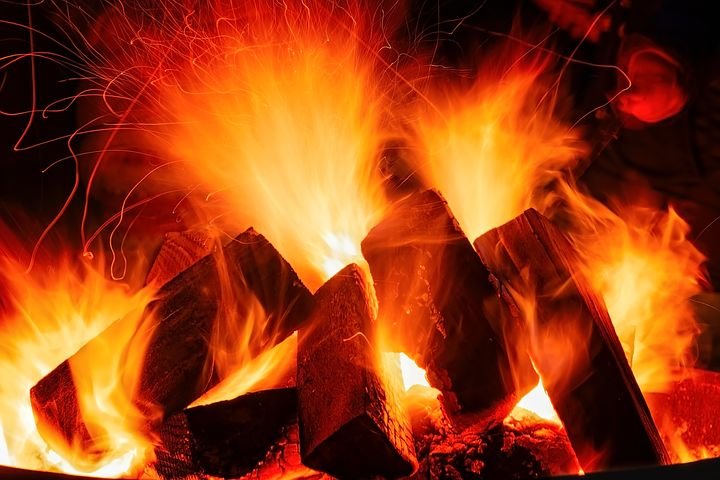
Staying Healthy, Part 2: WARMTH
How many different kinds of warmth can you think of? There is the warmth of a sunbeam, the warmth of a fire, warmth of interest, warmth of heart, warmth of anger, warmth of fever, and the fiery warmth of enthusiasm! Warmth is powerful–integrating and overlapping–and a tool that our body intentionally creates during an inflammation. Anthroposophic medicine places a lot of focus on warmth because it plays such a key role in processes of transformation.

How to Stay Healthy, Part 1: REST
When we get sick our body sends signals that it is time to rest. We don’t have much energy, we can’t do our usual activities, we need to sleep more. If we look at it from the outside—say if you were looking at another person who is “resting”—we might conclude that resting consists of not doing anything. This goes along with the saying “Rest is rust.” That outside view can make us think that stopping activity is bad, a loss or a waste, even make us feel guilty for slowing down.
But what about from the inside? Is resting just about being lazy? No. Consider sleep. Sleep provides the primary time for repair and recovery. Instead of our energy being directed to outside activity and outside impressions, during sleep (and intentional rest), our forces are redirected inward. If we don’t get sufficient rest then we may lose track of how we are doing inside.

Support for Weaning off of an Antidepressant
This might feel like a strange topic to bring up during a pandemic—shouldn’t we actually all be getting onto an antidepressant medication right now because of all of the hardship and worry that is happening in the world? The answer is, no, not as a first resort. We can learn from this time. We are being asked to understand ourselves in new ways and not just go back to the way things were, once outside circumstances make that possible. We are changing, and change can be very good. Consider it a kind of healing crisis.
Conventional antidepressants do have their role. They stabilize our nervous system and our emotional life and they can wonderful, life-saving medicines in the right situation. I prescribe them when needed and appreciate their support, but reserve them for when life is truly too overwhelming and there just needs to be some quiet pause….

The Unique Anxieties of the Nine-year Change
Do you remember when you were nine? Many people have vivid memories about particularly events or experiences at that age. Some people reflect back and become aware of how their connection with the world changed, how they began to notice new things, ask different questions. If you dig a little, a whole set of people report that this was the age when they actually got a first glimmer of their later life’s work.
What is most consistent, however, is that people remember feeling anxious. This age stands as a developmental eye of the needle, a passage, through which we first become aware of ourselves as true individuals and which naturally brings some anxiety with it.
It is vitally important to know about this threshold time of nine-years because it is now being misinterpreted. Children are too often now being diagnosed with an anxiety disorder at age nine, when we should actually view this period as an essential time of developmental transformation. We can do this if we know the context. There are good ways to help a child move successfully through this transition.

The Therapeutic Value of “Maintenance” as a Life Process
We all need to devote energy to “maintenance.” No, this does not refer to some kind of human 30,000-mile check, like what you might do for your car (although healthcare would be much simpler if it only required a new water pump or brake pads at certain intervals). No, we are referring to a different kind of maintenance. What is being recommended is more along the lines of taking the time to really work through what has been taken in, so that it can fully become one’s own.

Wild Gardening Manifesto
When the sun shines these days it feels glorious. With a lot rain in Colorado in the last month—including torrential downpours, lighting, hail the last nights—the contrast of rain and shine feels particularly strong. The ones who seem to appreciate the dry, bright days the most are the bees. I have a hive in my backyard and went to visit them this morning. There is a very particular smell to a beehive, a little like honey, a little musky, a bit like warmth, hard to describe but very distinctive. The bees are very happy, entering and leaving the hive so quickly that to follow the trail of one single bee is almost impossible. It is almost like trying to watch the drops of water in a waterfall—not easy, and not really the essence of a waterfall. The bees, like the waterfall, seem to live in a process of continual movement; the shifting, but continuous activity most important.

Biographical Rhythm and Crisis: Getting Unstuck: Part 4
Change catches us off guard all the time, but it doesn't always sneak up on us from the outside. Some of the biggest impulses for change surprise us by coming from the inside. That can be hard to make sense of because we are so used to constantly needing to respond to the events, expectations and relationships of our lives—but it is true! External events, outer changes make sense in a certain way because they adhere to the laws of cause and effect. If we suffer a loss or are experiencing a lot of anxiety related to an upcoming event we could place our feelings into that context and gain some consolation. In other words we learn to say: I feel this way because that happened. We know that significant loss brings grief and disorientation. We also know that the anxiety of anticipation can easily exhaust us as we try to make sure that everything has been properly considered and prepared. Those are painful experiences but they can be rationally understood. What happens when a life change starts inside of us and therefore doesn't necessarily match any of the outer circumstances around us? It can leave us frightened and confused because there is no immediate reason for feelings of grief or anxiety that seemingly well up out of nowhere. But those experiences are much less random than we might think.

Why Warmth is so Important
It is really important to nurture and protect your warmth. Warmth deserves more attention than it usually gets. Warmth holds a very special place in the life of both the developing child and the adult, because it works throughout the entire spectrum of human experience. There is physical warmth, emotional warmth—the warmth of love, of generosity, of true morality—and all of these “warmths” pour over and merge with each other. Perhaps most importantly, warmth is the essential ingredient in transformative work. Without warmth we cannot change, and our life is full of processes of growth and adaptation. Warmth helps us be healthy human beings on many different levels.

Finding Gratitude
It is a normal part of the passing of the year to look forward to the coming year and what it will bring. That is probably best done, however, by building on the gratitude of what has come before. In looking back we need to realize that we are all gifted, all blessed. Though perhaps this past year helped you experience that our “blessings” are not always the good, easy, and pleasurable experiences. Of course, we all wish for as large a helping of those as we can get, but sometimes the most potent growth comes from wisdom born out of challenge.

The Menstrual Cycle as a Breathing Process
Sometimes the most beautiful and important part of our physiology is flexibility. Can we shift and change ourselves? We do, of course, carry this out all the time—for when we take in a breath we open ourselves to the world around us (Rudolf Steiner actually pointed out that we are much more intimately related to our environment through respiration than through digestion or touch). Then when we breathe out, we cut ourselves off from outside world, and release what we do not need any more (carbon dioxide, nitrogen, etc.) This is a very regular, and familiar cycle, one which we generally carry out 16–24 times a minute. But there are other ways that we breathe too. The menstrual cycle can be understood as one such kind of respiration, one that brings aspects not just of inside and outside, but also life and death, generosity and loss.

Sigh, From Expansion to Duty—The End of Summer Journey into Fall
At the beginning of June we all experienced how at the beginning of summer it is hard to stay focused and responsible. This is because the whole natural world is breathing out. That expansion went a long way, and hopefully you had some opportunities to branch out, explore, and melt a little. That felt good, but just now, in the last few days, it is beginning to shift. Did you feel it? There are outer changes accompanying it—the days are getting noticeably shorter now, and if you look, the plant life has stopped growing up and out—so the whole gesture of the season is subtly different. For the plants, this cessation of growth does not mean that their activity has stopped, but it is now related more to refining the quality of what is already there. This is a time for ripening: grapes are starting to soften and sweeten, pears find a blush of color.

Falling Asleep is Hard to Do—Some Useful Tips
Falling asleep should be easy, right? Because we don't have to do anything special, we just stop our daytime activities and we should be able to go right to sleep. This may make sense logically, but it is a fallacy, mostly because in many areas of life we have lost our appreciation of the importance of transitions. That is partly because we are all trying to fit so many things into our day, and partly because we have become more and more accustomed to quick convenience.

Can we consciously influence our health?
When you ask this question of a large group of people, you are certain to get a variety of answers. Some will say “yes, absolutely!” and will give you examples of how mindfulness exercises (like meditation), exercise, a healthy diet and good social connections all improve your health. And there are indeed many clinical studies which have shown this to be true. How we think, and what we decide to do can have a definite influence on who we are and how we live. But there will also be a group of people who will say “no, not if you are really sick,” and can tell you that when you are having a gallbladder attack you can meditate are hard as you want, but what you really need is a surgeon. In a similar way, anyone who has experienced a major depression (which seems like it should be more accessible to our thinking than an inflamed gallbladder) can tell you that feeling better is not a matter of merely sitting down and deciding to feel “happier.” It doesn't work like that. So no, we can't really influence our health with our consciousness, but we can. The challenge is that the answer to the question seems to be both “yes!” and “no!” depending on who ask and what you are considering.